Moldova - MD - MDA - MDA - Europe
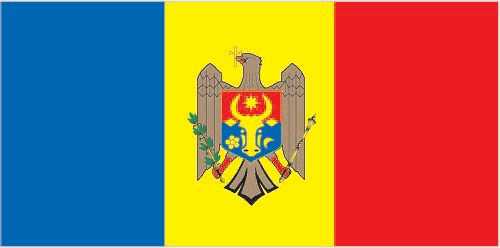
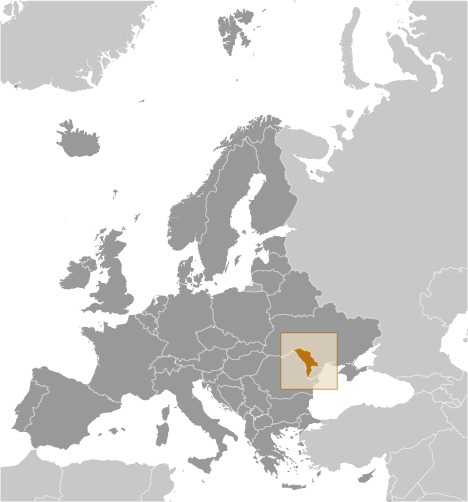
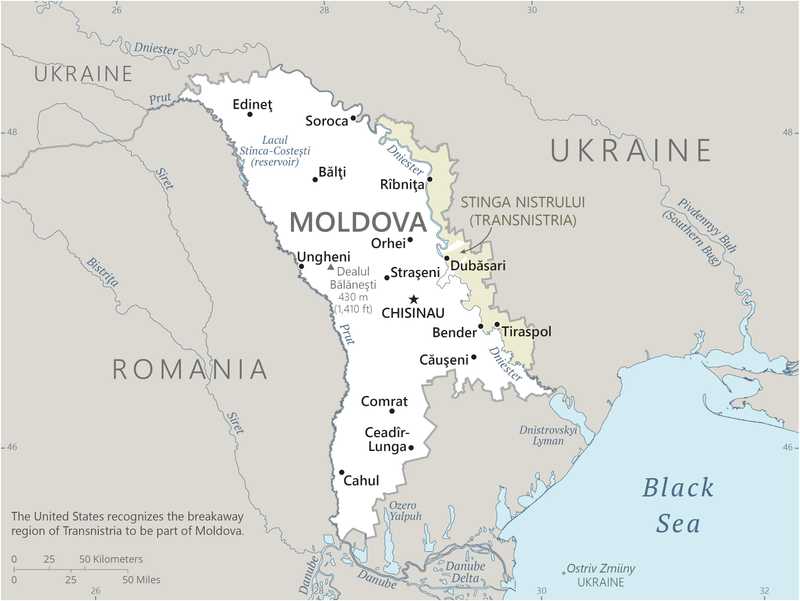
Moldova Images
Moldova Factbook Data
Diplomatic representation from the US
embassy: 103 Mateevici Street, Chisinau MD-2009
mailing address: 7080 Chisinau Place, Washington DC 20521-7080
telephone: [373] (22) 408-300
FAX: [373] (22) 233-044
email address and website:
ChisinauACS@state.gov
https://md.usembassy.gov/
Age structure
15-64 years: 70.2% (male 1,225,535/female 1,300,640)
65 years and over: 15% (2024 est.) (male 206,221/female 334,473)
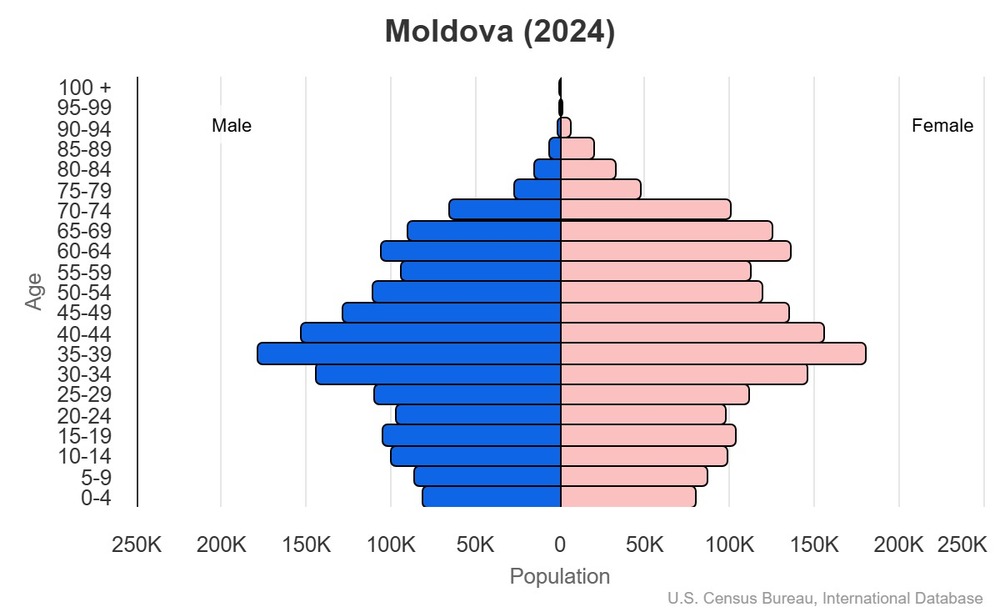
For additional information, please see the entry for Population pyramid on the Definitions and Notes page.
Geographic coordinates
Sex ratio
0-14 years: 1 male(s)/female
15-64 years: 0.94 male(s)/female
65 years and over: 0.62 male(s)/female
total population: 0.89 male(s)/female (2024 est.)
Natural hazards
Area - comparative
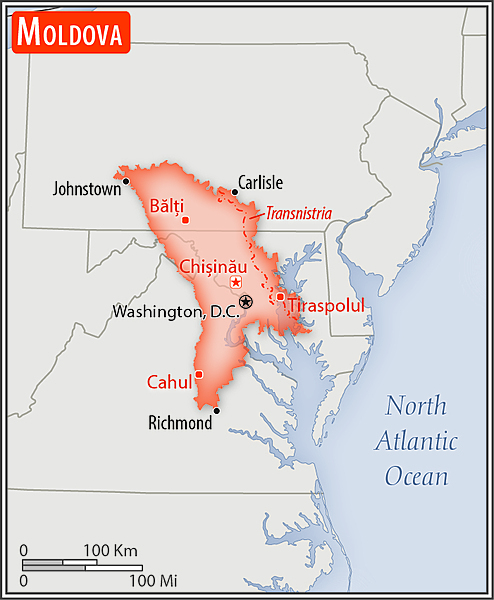
slightly larger than Maryland
Military service age and obligation
note: as of 2024, women made up about 23% of the military's full-time personnel
Background
A large portion of present-day Moldovan territory became a province of the Russian Empire in 1812 and then unified with Romania in 1918 in the aftermath of World War I. This territory was then incorporated into the Soviet Union at the close of World War II. Although Moldova has been independent from the Soviet Union since 1991, Russian forces have remained on Moldovan territory east of the Nistru River in the breakaway region of Transnistria.
Years of Communist Party rule in Moldova from 2001 to 2009 ultimately ended with election-related violent protests and a rerun of parliamentary elections in 2009. A series of pro-Europe ruling coalitions governed Moldova from 2010 to 2019, but pro-Russia candidate Igor DODON won the presidency in 2016, and his Socialist Party of the Republic of Moldova won a plurality in the legislative election in 2019. Pro-EU reformist candidate Maia SANDU defeated DODON in his reelection bid in 2020, and SANDU's Party of Action and Solidarity won a parliamentary majority in an early legislative election in 2021. Prime Minister Natalia GAVRILITA and her cabinet took office in 2021. In early 2023, Moldova's parliament confirmed a new cabinet led by Prime Minister Dorin RECEAN, which retained the majority of the former ministers.
Environmental issues
International environmental agreements
signed, but not ratified: Air Pollution-Multi-effect Protocol
Military expenditures
0.6% of GDP (2023 est.)
0.4% of GDP (2022 est.)
0.4% of GDP (2021 est.)
0.4% of GDP (2020 est.)
Population below poverty line
note: % of population with income below national poverty line
Household income or consumption by percentage share
highest 10%: 22.5% (2022 est.)
note: % share of income accruing to lowest and highest 10% of population
Exports - commodities
note: top five export commodities based on value in dollars
Exports - partners
note: top five export partners based on percentage share of exports
Administrative divisions
districts: Anenii Noi, Basarabeasca, Briceni, Cahul, Cantemir, Calarasi, Causeni, Cimislia, Criuleni, Donduseni, Drochia, Dubasari, Edinet, Falesti, Floresti, Glodeni, Hincesti, Ialoveni, Leova, Nisporeni, Ocnita, Orhei, Rezina, Riscani, Singerei, Soldanesti, Soroca, Stefan Voda, Straseni, Taraclia, Telenesti, Ungheni
municipalities: Balti, Bender, Chisinau
autonomous territorial unit: Gagauzia
territorial unit: Stinga Nistrului (Transnistria)
Agricultural products
note: top ten agricultural products based on tonnage
Military and security forces
Ministry of Internal Affairs: General Inspectorate of Police (GPI), Border Police Department, Carabinieri Troops Department (2025)
note: the Carabinieri is a quasi-militarized gendarmerie responsible for protecting public buildings, maintaining public order, and other national security functions; the GPI is the primary law enforcement body, responsible for internal security, public order, traffic, and criminal investigations
Budget
expenditures: $6.037 billion (2023 est.)
note: central government revenues (excluding grants) and expenditures converted to US dollars at average official exchange rate for year indicated
Capital
geographic coordinates: 47 00 N, 28 51 E
time difference: UTC+2 (7 hours ahead of Washington, DC, during Standard Time)
daylight saving time: +1hr, begins last Sunday in March; ends last Sunday in October
etymology: origin unclear but may derive from the Old Moldovan word kishineu ("spring" or "artesian well")
note: pronounced KEE-shee-now (KIH-shi-nyov)
Imports - commodities
note: top five import commodities based on value in dollars
Climate
Coastline
Constitution
amendment process: proposed by voter petition (at least 200,000 eligible voters), by at least one third of Parliament members, or by the government; passage requires two-thirds majority vote of Parliament within one year of initial proposal; revisions to constitutional articles on sovereignty, independence, and neutrality require majority vote by referendum; articles on fundamental rights and freedoms cannot be amended
Exchange rates
Exchange rates:
17.792 (2024 est.)
18.164 (2023 est.)
18.897 (2022 est.)
17.68 (2021 est.)
17.322 (2020 est.)
Flag
history: replaced the communist flag in 1990; the coat of arms is based on traditional designs
note 1: colors are based on the Romanian flag, but Moldova's blue band is lighter
note 2: one of three national flags that differ on each side -- the others are Paraguay and Saudi Arabia
Independence
Industries
Judicial branch
judge selection and term of office: Supreme Court of Justice judges appointed by the president on the recommendation of the Superior Council of Magistracy, an 11-member body of judicial officials; all judges serve 4-year renewable terms; Constitutional Court judges appointed 2 each by Parliament, the president, and the Higher Council of Magistracy for 6-year terms; court president elected by other court judges for a 3-year term
subordinate courts: Courts of Appeal; Court of Business Audit; municipal courts
note: the Constitutional Court is autonomous; it interprets the Constitution and reviews the constitutionality of parliamentary laws and decisions, decrees of the president, and acts of the government
Land boundaries
border countries (2): Romania 683 km; Ukraine 1202 km
Land use
arable land: 56.8% (2023 est.)
permanent crops: 8.1% (2023 est.)
permanent pasture: 9.4% (2023 est.)
forest: 11.3% (2023 est.)
other: 13.8% (2023 est.)
Legal system
Legislative branch
legislative structure: unicameral
number of seats: 101 (all directly elected)
electoral system: proportional representation
scope of elections: full renewal
term in office: 4 years
most recent election date: 9/28/2025
parties elected and seats per party: Action and Solidarity Party (PAS) (55); Electoral Bloc “Patriotic of Socialists, Communists, Heart and Future of Moldova” (26); Alternative Bloc (8); Our Party (6); Democracy at Home Party (6)
percentage of women in chamber: 37.6%
expected date of next election: September 2029
Maritime claims
International organization participation
note: Moldova is an EU candidate country whose satisfactory completion of accession criteria is required before being granted full EU membership
National holiday
Nationality
adjective: Moldovan
Natural resources
Geography - note
Economic overview
Political parties
Democracy at Home Party or PPDA
Future of Moldova Party or PVM
National Alternative Movement or MAN
Our Party or PN
Party of Action and Solidarity or PAS
Party of Communists of the Republic of Moldova or PCRM
Party of Development and Consolidation of Moldova or PDCM
Party of Socialists of the Republic of Moldova or PSRM
Railways
standard gauge: 14 km (2014) 1.435-m gauge
broad gauge: 1,157 km (2014) 1.520-m gauge
Suffrage
Terrain
Government type
Country name
conventional short form: Moldova
local long form: Republica Moldova
local short form: Moldova
former: Moldavian Soviet Socialist Republic, Moldovan Soviet Socialist Republic
etymology: named for the Moldova River in neighboring eastern Romania; the river's name probably comes from the Indoeuropean root word mel, meaning "dark" or "black"
Location
Map references
Irrigated land
Diplomatic representation in the US
chancery: 2101 S Street NW, Washington, DC 20008
telephone: [1] (202) 667-1130
FAX: [1] (202) 667-2624
email address and website:
washington@mfa.gov.md
https://sua.mfa.gov.md/en
Internet users
Internet country code
Refugees and internally displaced persons
IDPs: 6 (2024 est.)
stateless persons: 3,164 (2024 est.)
GDP (official exchange rate)
note: data in current dollars at official exchange rate
Total renewable water resources
School life expectancy (primary to tertiary education)
male: 15 years (2023 est.)
female: 15 years (2023 est.)
Urbanization
rate of urbanization: 0.09% annual rate of change (2020-25 est.)
Broadcast media
Drinking water source
urban: 97.7% of population (2022 est.)
rural: 87.7% of population (2022 est.)
total: 92% of population (2022 est.)
unimproved:
urban: 2.3% of population (2022 est.)
rural: 12.3% of population (2022 est.)
total: 8% of population (2022 est.)
National anthem(s)
lyrics/music: Alexei MATEEVICI/Alexandru CRISTEA
history: adopted 1994; originally a 12-verse poem, but only stanzas 1, 2, 5, 9, and 12 are included in the anthem
Major urban areas - population
International law organization participation
Physician density
Hospital bed density
National symbol(s)
Mother's mean age at first birth
GDP - composition, by end use
government consumption: 17.9% (2024 est.)
investment in fixed capital: 20% (2024 est.)
investment in inventories: 1.1% (2024 est.)
exports of goods and services: 31.4% (2024 est.)
imports of goods and services: -57.3% (2024 est.)
note: figures may not total 100% due to rounding or gaps in data collection
Citizenship
citizenship by descent only: at least one parent must be a citizen of Moldova
dual citizenship recognized: no
residency requirement for naturalization: 10 years
Population distribution
Electricity access
Civil aircraft registration country code prefix
Sanitation facility access
urban: 98.7% of population (2022 est.)
rural: 82.9% of population (2022 est.)
total: 89.7% of population (2022 est.)
unimproved:
urban: 1.3% of population (2022 est.)
rural: 17.1% of population (2022 est.)
total: 10.3% of population (2022 est.)
Ethnic groups
Religions
Languages
major-language sample(s):
Cartea informativa a lumii, sursa indispensabila pentru informatii de baza. (Moldovan/Romanian)
The World Factbook, the indispensable source for basic information.
note: data represent mother tongue; as of March 2023, "Romanian" replaced "Moldovan" as the name of Moldova's official language
Imports - partners
note: top five import partners based on percentage share of imports
Elevation
lowest point: Dniester (Nistru) 2 m
mean elevation: 139 m
Health expenditure
12.3% of national budget (2022 est.)
Military and security service personnel strengths
Military equipment inventories and acquisitions
Total water withdrawal
industrial: 583 million cubic meters (2022 est.)
agricultural: 55 million cubic meters (2022 est.)
Waste and recycling
percent of municipal solid waste recycled: 36.9% (2022 est.)
Major watersheds (area sq km)
Military - note
Moldova is constitutionally neutral but has maintained a relationship with NATO since 1992 and since 2022 has enhanced bilateral security cooperation with some NATO members; it has contributed small numbers of troops to NATO’s Kosovo Force (KFOR) since 2014, and a civilian NATO liaison office was established in Moldova in 2017 at the request of the Moldovan Government to promote practical cooperation and facilitate support; in 2024, Moldova signed a security and defense partnership agreement with the EU; it maintains close security relations with Romania, a member of the EU and NATO (2025)
Major rivers (by length in km)
note: [s] after country name indicates river source; [m] after country name indicates river mouth
National heritage
selected World Heritage Site locales: Struve Geodetic Arc
Coal
imports: 86,000 metric tons (2023 est.)
Electricity generation sources
solar: 1.7% of total installed capacity (2023 est.)
wind: 3.8% of total installed capacity (2023 est.)
hydroelectricity: 6.3% of total installed capacity (2023 est.)
biomass and waste: 0.2% of total installed capacity (2023 est.)
Natural gas
consumption: 2.223 billion cubic meters (2023 est.)
imports: 2.223 billion cubic meters (2023 est.)
Petroleum
Gross reproduction rate
Currently married women (ages 15-49)
Remittances
12% of GDP (2023 est.)
14% of GDP (2022 est.)
note: personal transfers and compensation between resident and non-resident individuals/households/entities
National color(s)
Particulate matter emissions
Labor force
note: number of people ages 15 or older who are employed or seeking work
Youth unemployment rate (ages 15-24)
male: 3.4% (2024 est.)
female: 3.3% (2024 est.)
note: % of labor force ages 15-24 seeking employment
Net migration rate
Median age
male: 38.6 years
female: 41.3 years
Debt - external
note: present value of external debt in current US dollars
Maternal mortality ratio
Reserves of foreign exchange and gold
$5.453 billion (2023 est.)
$4.474 billion (2022 est.)
note: holdings of gold (year-end prices)/foreign exchange/special drawing rights in current dollars
Public debt
note: central government debt as a % of GDP
Total fertility rate
Unemployment rate
1.6% (2023 est.)
0.9% (2022 est.)
note: % of labor force seeking employment
Carbon dioxide emissions
from coal and metallurgical coke: 219,000 metric tonnes of CO2 (2023 est.)
from petroleum and other liquids: 3.087 million metric tonnes of CO2 (2023 est.)
from consumed natural gas: 3.786 million metric tonnes of CO2 (2023 est.)
Area
land: 32,891 sq km
water: 960 sq km
Taxes and other revenues
note: central government tax revenue as a % of GDP
Real GDP (purchasing power parity)
$39.301 billion (2023 est.)
$38.835 billion (2022 est.)
note: data in 2021 dollars
Airports
Infant mortality rate
male: 16 deaths/1,000 live births
female: 11.5 deaths/1,000 live births
Gini Index coefficient - distribution of family income
note: index (0-100) of income distribution; higher values represent greater inequality
Inflation rate (consumer prices)
13.4% (2023 est.)
28.7% (2022 est.)
note: annual % change based on consumer prices
Current account balance
-$1.893 billion (2023 est.)
-$2.482 billion (2022 est.)
note: balance of payments - net trade and primary/secondary income in current dollars
Real GDP per capita
$16,000 (2023 est.)
$15,400 (2022 est.)
note: data in 2021 dollars
Broadband - fixed subscriptions
subscriptions per 100 inhabitants: 27 (2023 est.)
Tobacco use
male: 54.2% (2025 est.)
female: 6.4% (2025 est.)
Obesity - adult prevalence rate
Energy consumption per capita
Death rate
Birth rate
Electricity
consumption: 5.674 billion kWh (2023 est.)
exports: 94 million kWh (2023 est.)
imports: 1.264 billion kWh (2023 est.)
transmission/distribution losses: 550.069 million kWh (2023 est.)
Merchant marine
by type: bulk carrier 1, container ship 1, general cargo 44, oil tanker 7, other 22
Imports
$9.84 billion (2023 est.)
$10.265 billion (2022 est.)
note: balance of payments - imports of goods and services in current dollars
Exports
$5.866 billion (2023 est.)
$5.981 billion (2022 est.)
note: balance of payments - exports of goods and services in current dollars
Heliports
Alcohol consumption per capita
beer: 1.53 liters of pure alcohol (2019 est.)
wine: 3.57 liters of pure alcohol (2019 est.)
spirits: 2.25 liters of pure alcohol (2019 est.)
other alcohols: 0.1 liters of pure alcohol (2019 est.)
Life expectancy at birth
male: 66.1 years
female: 74.4 years
Real GDP growth rate
1.2% (2023 est.)
-4.6% (2022 est.)
note: annual GDP % growth based on constant local currency
Industrial production growth rate
note: annual % change in industrial value added based on constant local currency
GDP - composition, by sector of origin
industry: 16.8% (2024 est.)
services: 62.3% (2024 est.)
note: figures may not total 100% due to non-allocated consumption not captured in sector-reported data
Education expenditure
16% national budget (2024 est.)
Population growth rate
Telephones - mobile cellular
subscriptions per 100 inhabitants: 120 (2024 est.)
Executive branch
head of government: Prime Minister Alexandru MUNTEANU (since 1 November 2025)
cabinet: Cabinet proposed by the prime minister-designate, nominated by the president, approved through a vote of confidence in Parliament
election/appointment process: president directly elected for a 4-year term (eligible for a second term); prime minister designated by the president in consultation with Parliament; within 15 days from designation, the prime minister-designate must request a vote of confidence for his/her proposed work program from the Parliament
most recent election date: 3 November 2024
election results:
2024: In the second round of presidential elections, incumbent Maia SANDU (PAS) wins 55.4% of the vote, Alexandr STOIANOGLO (PSRM) 44.6; turnout is 54.3%
2020: Maia SANDU elected president in second round; percent of vote in second round - Maia SANDU (PAS) 57.7%, Igor DODON (PSRM) 42.3%
expected date of next election: 2028
Dependency ratios
youth dependency ratio: 20.8 (2025 est.)
elderly dependency ratio: 22.2 (2025 est.)
potential support ratio: 4.5 (2025 est.)
Population
male: 1,687,496
female: 1,891,434
Telephones - fixed lines
subscriptions per 100 inhabitants: 24 (2024 est.)